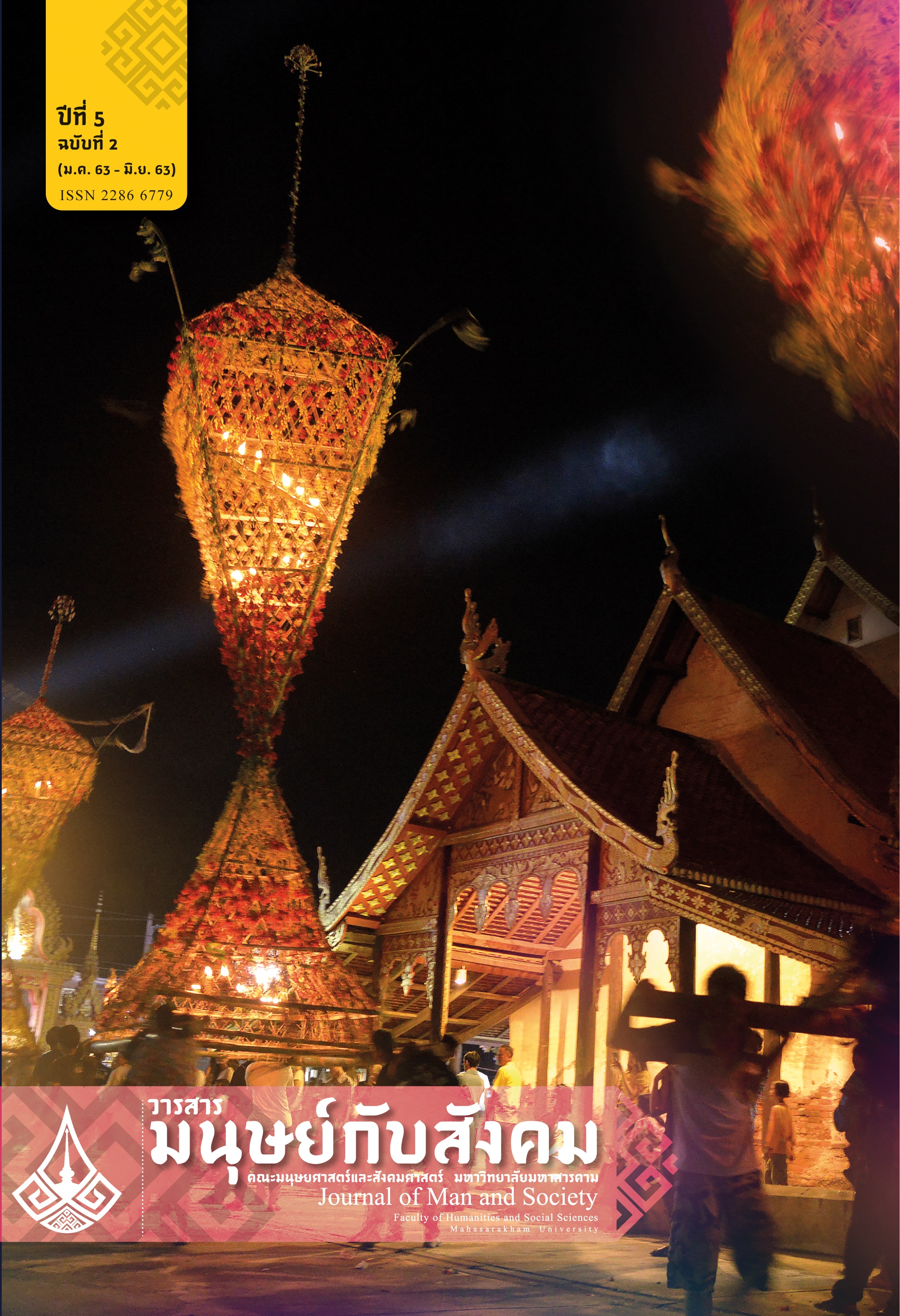การจัดการศึกษาเพื่อเสริมสร้างความเป็นพลเมือง ในระดับโรงเรียนของญี่ปุ่น
Main Article Content
บทคัดย่อ
บทความนี้มีเป้าหมายเพื่อศึกษานโยบาย แบบแผนการจัดการศึกษา ตลอดจนวิเคราะห์บริบทที่เอื้อต่อการเสริมสร้างความเป็นพลเมืองในโรงเรียนของญี่ปุ่น โดยใช้การวิจัยเอกสารและทบทวนวรรณกรรมเป็นวิธีหลักในการศึกษาวิจัย ผลการศึกษาพบว่า ญี่ปุ่นมีเป้าหมายการจัดการเรียนการสอนัาสุด ในปี ึกาาชนถึงดำรงอยลึกวจประเดเข้าใจและความรักต่อประวัติเพื่อพัฒนาผู้เรียนให้ได้รับความรู้ที่จำเป็นสำหรับนำไปใช้ “สร้างสังคมและชาติที่เป็นประชาธิปไตยอย่างสงบสุข” มีนโยบายการศึกษาตามหลัก “Zest for Life” ที่มุ่งพัฒนาพลเมืองในสามด้านหลัก คือ ความรู้ทางวิชาการ ความมีมนุษยธรรม และความสมบูรณ์แข็งแรงของร่างกาย นอกจากนี้ การจัดการเรียนการสอนเพื่อพัฒนาพลเมืองในโรงเรียนสามารถจำแนกได้เป็น 2 แบบแผน ได้แก่ การจัดการศึกษาเพื่อเสริมสร้างความเป็นพลเมืองอย่างเข้มข้นและบูรณาการในการศึกษาภาคบังคับ และการจัดการศึกษาเพื่อพัฒนาพลเมืองแบบปัจเจกในระดับมัธยมศึกษาตอนปลาย สำหรับบริบทที่เอื้อต่อการเสริมสร้างความเป็นพลเมืองประกอบด้วย บริบทบาทภายในและภายนอกโรงเรียน ได้แก่ 1) การพัฒนาองค์ความรู้และความเข้าใจของผู้เรียนตามหลักสูตร 2) การจัดการเรียนการสอนพัฒนาคุณลักษณะความเป็นพลเมืองอันพึงประสงค์ในโรงเรียน 3) มิติด้านการพัฒนาทักษะเพื่อสร้างเสริมความเข้าใจด้านความเป็นพลเมืองแบบบูรณาการ 4) การศึกษาทางสังคมนอกโรงเรียนโดยใช้ชุมชนและสังคมเป็นฐานในการพัฒนานักเรียน และ 5) กระบวนการผลิตซ้ำค่านิยมแบบคติร่วมในสังคมญี่ปุ่น
Article Details
เนื้อหาและข้อมูลที่ตีพิมพ์ลงในวารสารมนุษย์กับสังคม ถือเป็นข้อคิดเห็นและความรับผิดชอบโดยตรงของผู้เขียนซึ่งกองบรรณาธิการวารสารไม่จำเป็นต้องเห็นด้วยหรือร่วมรับผิดชอบใดๆ
บทความ ข้อมูล เนื้อหา รูปภาพ ฯลฯ ที่ได้รับการตีพิมพ์ในวารสารมนุษย์กับสังคม ถือเป็นลิขสิทธิ์ของวารสาร หากบุคคลหรือหน่วยงานใดต้องการนำทั้งหมดหรือส่วนหนึ่งส่วนใดไปเผยแพร่ต่อหรือเพื่่อกระทำการใดๆ จะต้องได้รับอนุญาตเป็นลายลักษณ์อักษรจากวารสารมนุษย์กับสังคมก่อน
เอกสารอ้างอิง
Aspinall, R. (2011). Who Runs Japan’s Schools? Education Governance and Management. In Zhao, Y., & Lei, J., & Li, G. (Eds.) Handbook of Asian Education: A Cultural Perspective. New York: Taylor & Francis.
Azuma, H. (1998). Japanese collectivism and education. In Paris, S., G., & Wellman, H., M. (Eds.), Global prospects for education: Development, culture, and schooling. American Psychological Association.
Berger, J. (2011). Is it a melting pot, salad, or buffet?: Culture and its impact on teaching. Midwest Research-to-Practice Conference in Adult, Continuing, Community and Extension Education, Linden wood University, St. Charles, MO, September 21-23, 2011.
Broom, C. (2017). Youth Civic Engagement in Context. In Broom, C. (ed.). Youth Civic Engagement in a Globalized World: Citizenship Education in a Comparative Perspective (Palgrave Studies in Global Citizenship Education and Democracy). New York: Palgrave Macmillan.
Chen, G., & Chung, J. (1993). The Impact of Confucianism on Organizational Communication. Annual Meeting of the 1993 SCA Convention, Miami Beach, Florida: USA.
Cogan, J., & Derricott, R. (2000). Citizenship for the 21st Century: An International Perspective on Education. London: Kogan Page.
Cogan, J., J., & Otsu, K. (2005). Contemporary Civics Education in Japan: Reflections on a Society in Transition. Pacific Asian Education, (17), 34-45.
Delgado-Algarra, E., J. (2016). History of Japanese Education: Keys to social and citizenship education. In Delgado-Algarra, E., J. (Eds.). Occidente en Japón y Japón en Occidente. Claves científicas, educativas y culturales para el intercambio entre Japón y Occidente. Huelva: Universidad de Huelva.
Grammes, T. (2012). Selected Review: Citizenship Education and Social Studies in Japan: A Short Guide to Recent Articles and Books for gaijin (Foreigners). Journal of Social Science Education, 11(2), 161–172.
Hirata, T. (2008). Personality and the Individual: The Problem of Civic Education in Japan and the Influence of Modern European Philosophy. The European Legacy, 1(3), 878-884. [Access on Taylor and Francis Online]
Hosak, I. (2011). English Language Teachers as Citizenship Educators. Ritsumeikan Social Sciences Review, 47(2), 187-206.
Ikeno, N. (2005). Citizenship Education in Japan After World War II. International Journal of Citizenship and Teacher Education, 1(2), 93-98.
Institute for Economics & Peace. (2019a). Global Terrorism Index 2019: Measuring the Impact of Terrorism. [Online]. Sydney, November 2019. Available from: http://visionofhumanity.org/reports [accesse December 14, 2019]
Institute for Economics & Peace. (2019b). Global Peace Index 2019: Measuring Peace in a Complex World, Sydney, June 2019. [Online]. Available from: http://visionofhumanity.org/reports [accesse December 14, 2019]
Kaelin, C., & Kochenov, D., & Lindeboom, J. (Eds.). (2019). Quality of Nationality Index: Global Ranking. [Online]. Henley & Partners Holdings Ltd. Retrieved from: https://www.nationalityindex.com/qni-rankings [accesse December 15, 2019]
Kimura, D., & Tatsuno, M. (2017). Advancing 21st Century Competencies in Japan. Center for Global Education.
McCullough, D. (2008). Moral and social education in Japanese schools: Conflicting conceptions of citizenship. Citizen Teaching and Learning, 4(1), 21-34.
MEXT. (2003). Report of Central Council for Education. Tokyo: MEXT.
MEXT. (2017). White Paper on Education, Culture, Sports, Science and Technology: Promoting Educational Reforms Based on the Revised Basic Act on Education / Reform of Elementary and Secondary Education to Usher in a New Era of Education. Tokyo: MEXT.
MEXT. (2018). Basic Education in Japan. [Online]. Retrieved from: http://www.mext.go.jp/en/policy/education/brochure/title01/detail01/1409899.htm [accesse November 11, 2019]
MEXT. (2019a). Education: Overview. [Online]. Retrieved from: http://www.mext.go.jp/en/policy/education/overview/index.htm [accesse November 5, 2019]
MEXT. (2019b). Improvement of Academic (Course of Study). Retrieved from: http://www.mext.go.jp/en/policy/education/elsec/title02/detail02/1373859.htm [accesse November 5, 2019]
MEXT. (2019c). Curriculum Guidelines ("Courses of Study") and ESD: Elementary School / Social Studies: Overall Objectives. Office of the Director-General for International Affairs: MEXT. [Online]. Retrieved from: http://www.mext.go.jp/en/unesco/title04/detail04/sdetail04/1375712.htm [accesse November 15, 2019]
MEXT. (2019d). Basic Act on Education (Act No. 120 of December 22, 2006). [Online]. Retrieved from: http://www.mext.go.jp/en/policy/education/lawandplan/ title01/detail01/1373798.htm [accesse November 15, 2019]
MEXT. (2019e). the Period for Integrated Studies. [Online]. Retrieved from: http://www.mext.go.jp/component/english/__icsFiles/afieldfile/2011/03/17/1303755_012.pdf [accesse November 15, 2019]
MEXT. (2019f). Improvement of Academic Abilities (Courses of Study: Living Environment.). Retrieved form: [Online]. http://www.mext.go.jp/component/english/__icsFiles/afieldfile/2011/03/17/1303755_006.pdf [accesse November 17, 2019]
MEXT. (2019g). Basic Act on Education: Political Education. [Online]. Retrieved from: http://www.mext.go.jp/en/policy/education/lawandplan/title01/detail01/1373798.htm [accesse November 18, 2019]
MEXT. (2019h). Curriculum Guidelines ("Courses of Study") and ESD: High School / Civics: Modern Society. [Online]. Retrieved from: http://www.mext.go.jp/en/unesco/title04/detail04/sdetail04/1375712.htm [accesse November 18, 2019]
Nakayasu, C. (2016). School Curriculum in Japan. The Curriculum Journal, 27(1), 134-150.
Otsu, K. (2002). Recent Developments in Civic Education: The Case of Japan. In Cogan, J. L., & Print, M. (Eds.). Civic Education in the Asia-Pacific Region: Case Studies Across Six Societies. New York: Routledge.
MEXT--. (2008). Citizenship Education Curriculum in Japan. In Grossman, D.L., & On Lee, W., & Kennedy, K., J. (Eds.). Citizenship Curriculum in Asia and the Pacific. Hong Kong: Comparative Education Research Center, The University of Hong Kong.
Takaya, K. (2017). Citizenship Education in Japan: Past, Present, and Future. In Broom, C. (ed.). Youth Civic Engagement in a Globalized World: Citizenship Education in Comparative Perspective. Palgrave Studies in Global Citizenship Education and Democracy. New York: Palgrave Macmillan.
The Economist Intelligent Unit. (2019). Democracy Index 2019. [Online]. Retrieved from:
http://www.eiu.com/topic/democracy-index [accesse December 14, 2019]
Westheimer, J., & Kahne, J. (2004). What kind of citizen? The politics of educating for democracy. American Educational Research Journal, 41(2), 237-269.


